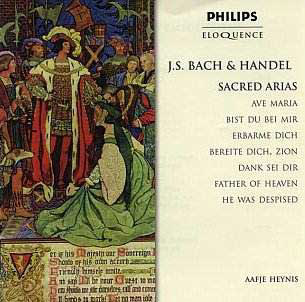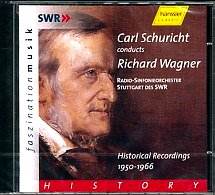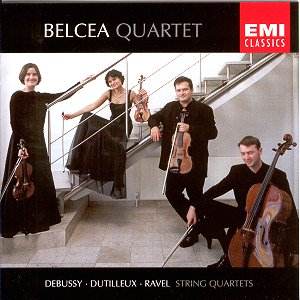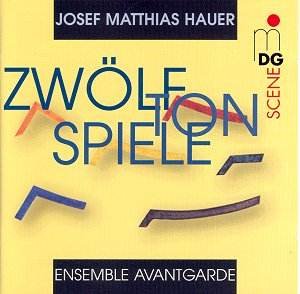 Composer: Johann Sebastian Bach
Composer: Johann Sebastian Bach
Works: Bist du bei mir, BWV 508; Was mein Herz von dir begehrt (from Cantata Es ist euch gut, daß ich hingehe, BWV 108); Erbarme dich (from St Matthew Passion, BWV 244); Bereite dich, Zion (from Christmas Oratorio, BWV 248); Es ist vollbracht (from St John Passion, BWV 245); Ave Maria (arr. Gounod); Schlafe mein Liebster (from Christmas Oratorio, BWV 248); Arioso Dank sei dir (attrib. Handel); Father of Heaven (from Judas Maccabeus); Return, oh God of Hosts (from Samson); Virgam Virtutis Tuae (from Dixit Dominus); Oh thou that tellest (from Messiah); He was despised (from Messiah).
Performers: Aafje Heynis (contralto); Pierre Polla (organ); Pro Musica Choir, cond. Lex Karsemeijer; Meindert Boekel (organ); Amsterdam Chamber Orchestra, cond. Marinus Voorberg; Vienna Symphony Orchestra, cond. Hans Gillesberger.
Recording: Various tracks recorded between 1957 and 1970; remastered by ELOQUENCE.
Label: PHILIPS
The juxtaposition of Bach and Handel in this compilation of sacred arias provides a fascinating lens through which to view the evolution of Baroque vocal music. Both composers, contemporaries in the late 17th and early 18th centuries, encapsulated the spiritual fervor of their time, yet their approaches to sacred text and musical expression diverged significantly. Bach’s intricate counterpoint often serves as a vehicle for emotional depth, while Handel’s robust melodies prioritize clarity and dramatic impact. This recording, featuring the contralto Aafje Heynis, offers a captivating exploration of their artistry through a thoughtful selection of works.
Heynis’s voice, rich and enveloping, immediately commands attention. Her interpretation of Bach’s “Erbarme dich” reveals a profound understanding of the aria’s emotional landscape. The use of vibrato is judicious, enhancing the poignant expressiveness of the text without overwhelming the line. Her phrase endings are consistently polished, and her skillful management of register transitions imbues the performance with a seamlessness that is both rare and admirable. However, the orchestral accompaniment, led by Gillesberger and the Vienna Symphony Orchestra, occasionally falters under the weight of antiquated performance practices. The tempo in “Erbarme dich” drags, risking sentimentality despite Heynis’s insightful vocal delivery. This clash between her vibrant interpretation and the orchestra’s sluggishness results in a performance that, while emotionally resonant, lacks the dynamism that modern audiences often expect.
The recording quality, a product of multiple sessions spanning over a decade, varies across the tracks, with some selections exhibiting a clarity that allows for the nuanced interplay of voice and instrument to shine. Yet, others, particularly the Bach-Gounod “Ave Maria,” suffer from a dated, mono sound that diminishes the impact of the work. This particular track emerges as a misstep, marred by an uninspired choral backdrop and a distracting audience presence, which detracts significantly from the intended sacred atmosphere. In contrast, the arias from Handel’s “Messiah” allow Heynis’s vocal prowess to take center stage, particularly in “He was despised,” where her articulation and emotional clarity are on full display, effectively capturing the aria’s profound pathos.
Comparatively, while Heynis’s artistry may not yet be as celebrated as that of her contemporary Kathleen Ferrier, her performances here stand as a testament to her vocal gifts and interpretative depth. Ferrier’s recordings remain benchmarks of interpretation, but Heynis’s rich timbre and thoughtful phrasing offer a compelling alternative that should not be overlooked. The absence of extensive documentation in the booklet is regrettable; while it provides minimal biographical information, it fails to contextualize the selections or offer texts, leaving listeners seeking deeper engagement with the music somewhat unfulfilled.
This collection, despite its flaws, serves as a valuable reminder of the artistry of Aafje Heynis and the emotional power embedded in Bach and Handel’s sacred music. The price point of this remastered release makes it an enticing option for collectors and admirers of fine singing, especially those willing to embrace the historical context of the performances. While the orchestral interpretations may occasionally stumble, Heynis’s vocal artistry ultimately elevates the entire endeavor, rendering this a worthwhile addition to the library of any Baroque enthusiast.



